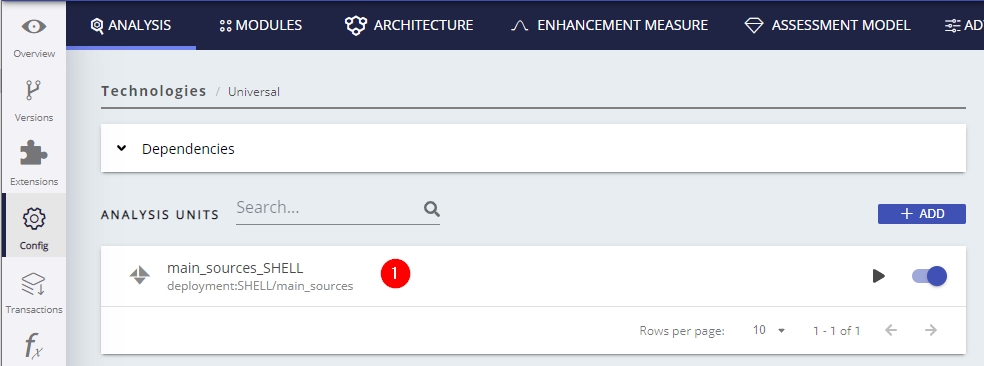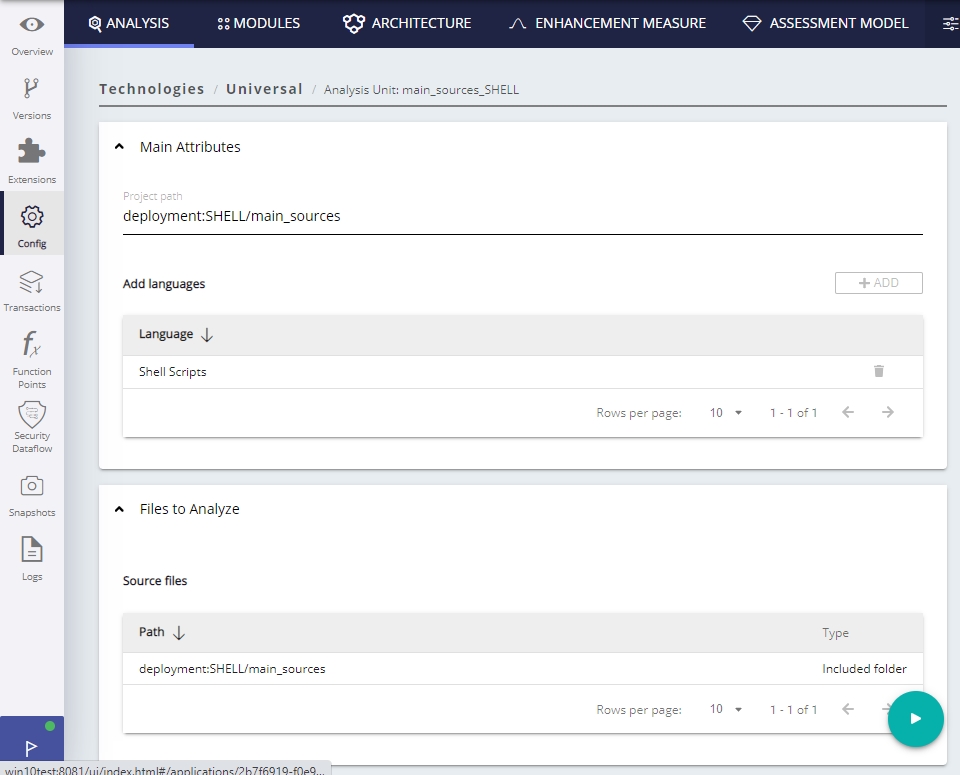Shell - 1.3
Extension ID
com.castsoftware.shell
What’s new?
Please see Shell 1.3 - Release Notes for more information.
Description
This extension provides support for applications written using UNIX Shell languages.
Although this extension is officially supported by CAST, please note that it has been developed within the technical constraints of the CAST Universal Analyzer technology and to some extent adapted to meet specific customer needs. Therefore the extension may not address all of the coding techniques and patterns that exist for the target technology and may not produce the same level of analysis and precision regarding e.g. quality measurement and/or function point counts that are typically produced by other CAST AIP analyzers.
In what situation should you install this extension?
If your application contains source code written using UNIX Shells and you want to view these object types and their links with other objects, then you should install this extension.
Supported UNIX shells
This version of the extension provides partial support for:
| UNIX shell | Supported |
|---|---|
| Bourne shell (bsh/sh/shell) | |
| Bourne-Again Shell (bash) | |
| C shell (csh) | |
| KornShell (ksh) | |
| Secure Shell (ssh) | |
| Tenex C Shell (tcsh) |
Function Point, Quality and Sizing support
This extension provides the following support:
- Function Points (transactions): a green tick indicates that OMG Function Point counting and Transaction Risk Index are supported
- Quality and Sizing: a green tick indicates that CAST can measure size and that a minimum set of Quality Rules exist
| Function Points (transactions) |
|
|---|---|
| Quality and Sizing |
AIP Core compatibility
This extension is compatible with:
| AIP Core release | Extension release | Supported |
|---|---|---|
| 8.3.x | ≥ 1.0.1 |
Download and installation instructions
The extension will be automatically downloaded and installed in AIP Console when you deliver Shell code (i.e. any file with an extension listed below).
Prepare and deliver the source code
Once the extension is downloaded and installed, you can now package your source code and run an analysis. The process of preparing and delivering your source code is described below:
Source code preparation
Only files with following extensions will be analyzed:
- *.bash
- *.bsh
- *.csh
- *.ksh
- *.sh
- *.shell
- *.ssh
- *.tsch
If any files intended for other applications are included in the delivery and which are renamed to supported Shell extensions, the following effects might be observed during an analysis:
- inconsistent objects may get created
- end of string ’’’ not found errors
- if the file is binary: Invalid UTF-8 sequence found in text to be matched or searched for a regular expression
Source code preprocessing
Shell source code needs to be preprocessed so that CAST can understand it and analyze it correctly. This code preprocessing is actioned automatically when an analysis is launched or a snapshot is generated (the code is preprocessed before the analysis starts). The Shell Preprocessor log file is stored in the following location:
%PROGRAMDATA%\CAST\CAST\Logs\<application_name>\Execute_Analysis_<guid>\com.castsoftware.shell.<_extension_version>.prepro_YYYYMMDDHHMMSS.log
Note that the LISA folder will be used to analyze the preprocessed files.
Analysis configuration and execution
There are no analysis/technology configuration options available for Shell, however you should check that at least one Shell analysis unit has been created as shown below.
AIP Console exposes the technology configuration options once a version has been accepted/imported, or an analysis has been run. Click Universal Technology (3) in the Config (1) > Analysis (2) tab to display the available options for your Shell source code:
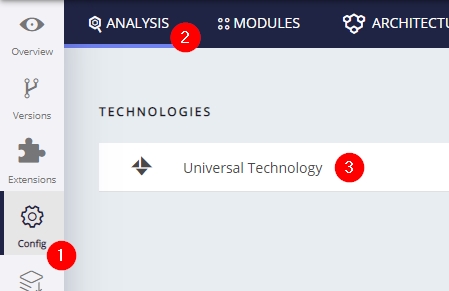
Then choose the relevant Analysis Unit (1) to view the configuration:
Logging mechanism
Analysis log files
Analysis logs are stored in the default locations.
Shell Preprocessor
Shell Preprocessor log files (the preprocessor is launched automatically during an analysis) are stored in the following locations:
| Location | Log file name |
|---|---|
| %PROGRAMDATA%\CAST\CAST\Logs\unique_application_id>\ | com.castsoftware.shell.prepro_<ExtensionVersion>_<YYYYMMDDHHMMSS>.log |
What results can you expect?
Objects
| Icon | Description |
|---|---|
|
Shell Project |
|
Shell Program |
|
Shell Function, Shell Special Function Note that these objects are note displayed in CAST Imaging's Reduced or Simplified Call Graph view. |
|
Shell Variable |
|
Shell Call to Java Program |
|
Shell Call to Generic Program |
| Amazon Web Services | |
|
Shell AWS Lambda Function |
|
Shell Call to AWS Lambda Function |
|
Shell Call to AWS Unknown Lambda Function |
|
Shell AWS S3 Bucket |
|
Shell AWS Unknown S3 Bucket |
|
Shell AWS DynamoDB Database |
|
Shell AWS DynamoDB Table |
|
Shell AWS Unknown DynamoDB Table |
|
Shell AWS SNS Publisher, Shell AWS SQS Publisher |
|
Shell AWS SNS Subscriber, Shell AWS SQS Receiver |
|
Shell AWS Unknown SNS Publisher, Shell AWS Unknown SQS Publisher |
|
Shell AWS Unknown SNS Subscriber, Shell AWS Unknown SQS Receiver |
|
Shell GET service request |
|
Shell POST service request |
|
Shell PUT service request |
|
Shell DELETE service request |
|
Shell SMS, Shell Email |
Links
| Source Object | Link Type | Target Object |
|---|---|---|
| Shell Program | callProgLink | Shell Program |
| Shell Program | include | Shell Program |
| Shell Program | callLink | Shell Function/Special Function |
| Shell Function/Special Function | callLink | Shell Program |
| Shell Function/Special Function | callLink | Shell Function/Special Function |
| Shell Function/Special Function/Program | use select, update, insert, delete | data functions |
| Shell Function/Special Function/Program | callLink | Shell Call to Java Program |
| Shell Function/Special Function/Program | callLink | Shell Call to Generic Program |
| Shell Function/Special Function/Program | callLink | SQL Table |
| Shell Function/Special Function/Program | callLink | SQL Script |
Embedded SQL
Shell allows the use of here-document to write SQL queries, for example:
##!/bin/sh
/opt/solid/bin/solsql db db <<abc
select count(*) from table_1;
select count(*) from table_2;
exit;
!;
abc
The Shell extension can use these queries to create links.
Call to SQL script
The Shell extension allows links to SQL script when used with a dependency to the SQL analyzer
For example:
script.sh
##!/bin/env bash
sqlplus script.sql
script.sql
CREATE TABLE ...
In Enlighten

Links to external programs
The following call pattern are supported
- ./exe
- /path/to/exe
- python
- java
- nohup
- eval
- wlst.sh
- runcobol | runcobol.exe
Shell to Java links
The extension does support links between Shell programs and Java objects (for example methods). Links will be created between these technologies.
The extension manages call to Java classes and .jar files. For .jar files no links will go further as .jar aren’t handle by any extensions, the link is purely informative.
Basic Case
...
/bin/java UpdateRepartiteurs
...
wil generate the following diagram
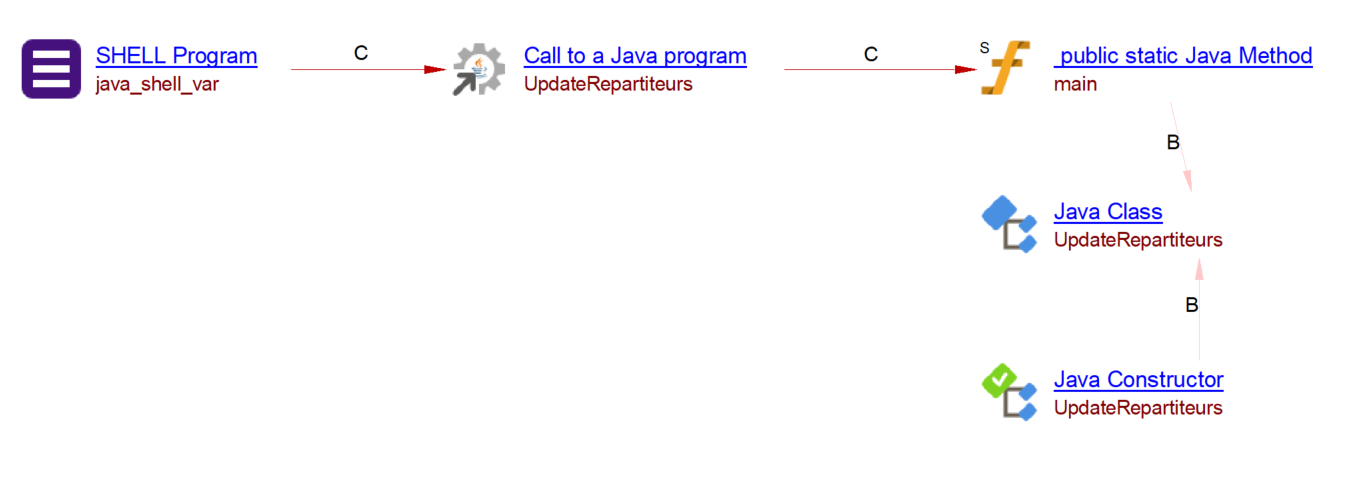
Function Case
...
MajRepartiteurs ()
{
...
java UpdateRepartiteurs
...
}
...
will generate the following diagram

Shell to COBOL links
The extension does support links between Shell programs and COBOL objects (for example programs). Links will be created between these technologies.
Basic Case
COBOL file
IDENTIFICATION DIVISION.
PROGRAM-ID. HELLO.
* simple hello world program
PROCEDURE DIVISION.
DISPLAY 'Hello world!'.
SHELL script
./hello
will generate the following diagram

Shell to Python links
The extension does support links between Shell programs and Python objects (for example methods). Links will be created between these technologies.
The following script
...
python foo.py
...
will generate the following diagram, assuming that foo.py exists and has been analyzed

Support for AWS CLI
Lambda
| Supported API | Link type | Caller | Callee | Remarks |
|---|---|---|---|---|
| aws lambda invoke | callLink | Shell Program | Shell Call to AWS Lambda Function | |
| aws lambda create-function | N/A | N/A | N/A | Creates a Shell AWS Lambda Function with handler and runtime properties (when resolved). |
An example of a command invoking a lambda named my-function.
$ aws lambda invoke --function-name my-function
When analyzing it, a Shell Call to AWS Lambda function object is created. This object will be linked to lambda functions objects (which may be created by other extensions) having the same name during application level analysis stage by the web services linker extension. When the name of an invoked Lamba function is not evaluated (either because of the absence of information or technical limitations) a Shell Call to AWS Unknown Lambda Function* *is created instead. A maximum of one call for each lambda (including unknowns) is created per caller.
An example of a command creating an AWS Lambda of name my-function where the handler is a javascript method.
$ aws lambda create-function --function-name my-function --zip-file fileb://function.zip --handler index.handler --runtime nodejs12.x --role arn:aws:iam::123456789012:role/lambda-ex
When analyzing it, a Shell AWS Lambda Function object is created. It contains the runtime and handler properties (here nodejs12.x and index*.handle*r, respectively). The linking from the lambda function to the handler function is then carried out during application level analysis stage by one of the following extensions (depending on the runtime):
| Runtime | Extension | Minimum required extension release |
|---|---|---|
| Java | com.castsoftware.awsjava | 1.2.0-alpha3 |
| .NET | com.castsoftware.awsdotnet | 1.0.0-alpha5 |
| Python | com.castsoftware.python | 1.4.0-beta7 |
| Node.js | com.castsoftware.nodejs | 2.7.0-beta3 (when the handler is written in .js) |
| TypeScript | com.castsoftware.typescript | 1.9.0-alpha1 (when the handler is written in .ts) |
Below we illustrate the expected results with a few aws commands. The code samples used are adaptations from available examples in official AWS documentation pages.
Example
In the following code we enclose three cli calls to aws lambda services in three different shell functions:
CreateFunction() {
aws lambda create-function --function-name my-lambda --runtime nodejs10.x --zip-file fileb://my-function.zip --handler my-function.handler --role arn:aws:iam::123456789012:role/service-role/MyTestFunction-role-tges6bf4
}
InvokeFunction1() {
aws lambda invoke --function-name my-function --payload '{ "name": "Bob" }' response.json
}
## it contains an unresolved variable
InvokeFunction2() {
aws lambda invoke --function-name $VarFunctionName --payload '{ "name": "Bob" }' response.json
}
As a result of the code above, a AWS Lambda function is created, and two calls to a AWS Lambda functions (one resolved and one unresolved).
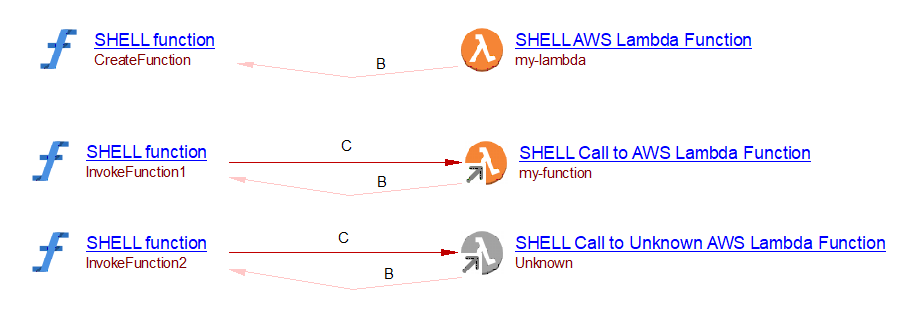
The Lambda function object contains the runtime and handler properties (see details above in the section) necessary for linking to the respective handler in different technologies.
S3
There are at least two different APIs for manipulation of S3 buckets. The s3api command is used for low level manipulation where s3 has a higher-level functionality.
| API (s3) | Link type | Caller | Callee | Remarks |
|---|---|---|---|---|
| aws s3 cp | useSelectLink, useInsertLink | Shell Program or Function | Shell AWS S3 Bucket | |
| aws s3 mb | N/A | N/A | N/A | Creates a bucket |
| aws s3 mv | useDeleteLink, useInsertLink | Shell Program or Function | Shell AWS S3 Bucket | |
| aws s3 ls | useSelectLink | Shell Program or Function | Shell AWS S3 Bucket | When no bucket is specified, a link to each buckets is created |
| aws s3 presign | callLink | Shell Program or Function | Shell AWS S3 Bucket | No URL creation is modelized. |
| aws s3 rb | callLink | Shell Program or Function | Shell AWS S3 Bucket | rb deletes an empty bucket (so the creation of a useDeleteLink is excluded). |
| aws s3 rm | useDeleteLink | Shell Program or Function | Shell AWS S3 Bucket | |
| aws s3 sync | useSelectLink, useInsertLink | Shell Program or Function | Shell AWS S3 Bucket | |
| aws s3 website | callLink | Shell Program or Function | Shell AWS S3 Bucket |
In the absence of explicit bucket creation, references to buckets in other commands are used to create table objects.
| API (s3api) with CRUD links | Link type | Caller | Callee |
|---|---|---|---|
| aws s3api get-object | useSelectLink | Shell Program or Function | Shell AWS S3 Bucket |
aws s3api get-object-torrent |
|||
| aws s3api select-object-content | |||
| aws s3api list-objects | |||
| aws s3api list-objects-v2 | |||
| aws s3api list-parts | |||
| aws s3api delete-bucket | useDeleteLink | Shell Program or Function |
Shell AWS S3 Bucket |
| aws s3api delete-object | |||
| aws s3api delete-objects | |||
| aws s3api put-object | useInsertLink | Shell Program or Function | Shell AWS S3 Bucket |
| aws s3api restore-object | |||
| aws s3api upload-part | |||
| aws s3api copy-object | useSelectLink, useInsertLink |
Shell Program or Function | Shell AWS S3 Bucket |
For the list of commands acting on a bucket that are modelized with a callLink, expand the list below
Click here to expand other methods…
| API | Link type | Caller | Callee |
|---|---|---|---|
|
callLink | Shell Program or Function | Shell AWS S3 Bucket |
Example
In the following code we show a few calls to s3 and s3api commands.
Hello () {
aws s3 cp test.txt s3://bucket1/test2.txt
}
MoveFile () {
aws s3 mv s3://bucket19/test.txt s3://${BUCKET}/
}
GetObject () {
aws s3api get-object --bucket text-content --key dir/my_images.tar.bz2 my_images.tar.bz2
}
GetObjectUnresolved () {
aws s3api get-object --bucket $UnknownVar --key dir/my_images.tar.bz2 my_images.tar.bz2
}
The resulting buckets and links:
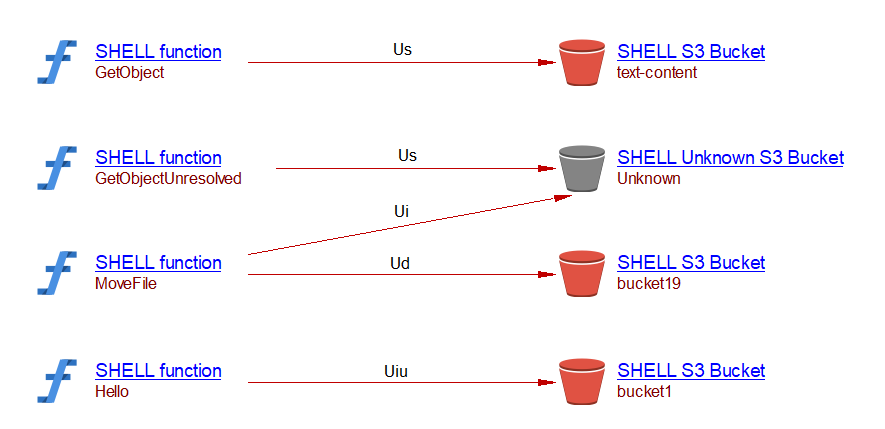
If the name of a bucket is not resolved, an unknown object is created as shown above. Note that a maximum of one unknown (SHELL) bucket will be created per project. However, if the name of the bucket is partially resolved, a normal bucket object will be created, with the unresolved name fragments replaced by the “?” character (example not shown here).
SQS
The supported API:
| API | Link Type | Caller | Callee |
|---|---|---|---|
| aws sqs send-message | callLink | Shell Program or Function | Shell AWS SQS Publisher |
| aws sqs send-message-batch | callLink | ||
| aws sqs receive-message | callLink | Shell AWS SQS Receiver | Shell Program or Function (optional) |
Example
In the following code we send a message with the Send function and we retrieve the message in the Receive function:
Send () {
aws sqs send-message --queue-url https://sqs.us-east-1.amazonaws.com/80398EXAMPLE/MyQueue --message-body "Information about the largest city in Any Region." --delay-seconds 10 --message-attributes file://send-message.json
}
Receive () {
aws sqs receive-message --queue-url https://sqs.us-east-1.amazonaws.com/80398EXAMPLE/MyQueue --attribute-names All --message-attribute-names All --max-number-of-messages 10
}
The results in Enlighten show the created objects with name equal to the Queue url:

The callLink links between the Publisher and the respective Receivers are created by the Web Services Linker extension during application level based on the Queue name registered in the queueName property. The handler of the receiver is the function Receive itself, responsible of treating the received data.
When the evaluation of the queue name fails, a Shell AWS Unknown SQS Publisher (or Receiver) object will be created.
SNS
| API | Link Type | Caller | Callee |
|---|---|---|---|
| aws sns publish | callLink | Shell Program or Function | Shell AWS SNS Publisher, Shell SMS |
| aws sns publish_batch | callLink | ||
| aws sns subscribe | callLink | Shell AWS SNS Publisher | Shell SMS, Shell Email |
The supported protocols are the following:
| Protocol | Object/s created | Name of the object |
|---|---|---|
| email/email-json | Shell Email | an Email (the email addresses are not evaluated) |
| http/https | Shell POST service request | the url (evaluated from the endpoint) |
| lambda | Shell Call to AWS Lambda Function | the name of the lambda function (evaluated from the endpoint) |
| sms | Shell SMS | an SMS (the SMS numbers are not evaluated) |
| sqs | Shell AWS SQS Publisher | the name of the queue (evaluated from the endpoint) |
The callLink links between the Publisher and the respective Subscribers are created by the Web Services Linker extension during application level.
For each method a maximum of one subscriber per given topic will be created as shown in the image above.
Example 1
In the following code we have to functions, one publishing into a topic, and the other one subscribing to different notification endpoints of different protocols.
Publish () {
aws sns publish --topic-arn "arn:aws:sns:us-west-2:123456789012:my-topic" --message file://message.txt
}
Receive() {
aws sns subscribe --topic-arn arn:aws:sns:us-west-2:123456789012:my-topic --protocol email --notification-endpoint my-email@example.com
aws sns subscribe --topic-arn arn:aws:sns:us-west-2:123456789012:my-topic --protocol sms --notification-endpoint 123456789
aws sns subscribe --topic-arn arn:aws:sns:us-west-2:123456789012:my-topic --protocol sqs --notification-endpoint arn:partition:service:region:account-id:queueName
aws sns subscribe --topic-arn arn:aws:sns:us-west-2:123456789012:my-topic --protocol lambda --notification-endpoint fooarn:function:lambda_name:v2
aws sns subscribe --topic-arn arn:aws:sns:us-west-2:123456789012:my-topic --protocol http --notification-endpoint http://foourl
}
The callLink links between the Publisher and the respective Subscribers are created by the Web Services Linker extension during application level.

For each method a maximum of one subscriber per given topic will be created as shown in the image above.
When the evaluation of the topic name fails, a Shell AWS Unknown SNS Publisher (or Subscriber) object will be created.
Example 2
We can also have direct sms deliveries from calls to publish API command:
PublishSMS () {
aws sns publish --message "Hello world!" --phone-number +1-555-555-0100
}
resulting in the direct callLink to the Shell SMS object:

DynamoDB
Please refer: DynamoDB support for Shell source code
Structural Rules
The following structural rules are provided:
| 1.3.0 | https://technologies.castsoftware.com/rules?sec=srs_shell&ref=||1.3.0-funcrel |
You can also find a global list here: https://technologies.castsoftware.com/rules?sec=t_1016000&ref=||.
Limitations/known issues
Script file import
This extension does not support the “import” of functions defined in other script files using “sourcing” (see https://www.mkssoftware.com/docs/man1/dot.1.asp), therefore no links are expected between functions declared in other script files Note that “sourcing” is supported when used in variable definitions.
Deployment folder path
The deployment folder path should contain only ASCII characters (due to the way the command line text is passed in a Windows operating system). Names of folders and files inside the deployment folder can contain non-ASCII characters.
Links to database objects
When your Shell scripts contain references to database objects in the server side element of an application and these references use fully qualified names for the database object, no links will be created between Shell and the database objects when you have used the SQL Analyzer extension to analyze the SQL if SQL Analyzer does not create database objects with same name. If you have used the SQL analyzers embedded in CAST AIP to analyze the SQL, then links will be created as normal. This is a known issue.
Metrics Assistant (embedded in CAST AIP) limitations
Searches not limited only to embedded SQL
The MA (Metric Assistant) which is used for metric search cannot search only in embedded SQL. Some Shell rules may be affected by this limitation and may produce false violations.
Cannot calculate metric excluding comments
The MA (Metric Assistant) which is used for metric search cannot search correctly while excluding comments especially if comments start or end adjacent to the keyword. If such a condition exists, random false violations may occur.
Shell embedded strings
Shell code allows string to be embedded in strings as shown in the code sample below. Currently, the Shell extension (and other Universal Analyzer type extensions) will consider this as one continuous string. Because we do not have any way to identify perfect end string patterns in this case, we cannot find the end of string and therefore the file will be skipped during the analysis.
echo '
Outer string ;
cat '$file03'
Another outer string
'$id'
' | $command
KSH: guessing of ending single\double quote
Note that this limitation is no longer applicable to Shell ≥ 1.0.10.
KSH supports the guessing of ending single/double quotes. The Shell extension supports this when the string is in single line, however, it is not supported when the string is in a multiple line, for example:
export OUTPUT=`basename $SOME_VARIABLE | $AWK 'FS="-" {
i=3
tmpMachineName= "mach_"$2
while ( i <= NF){
tmpMachineName=tmpMachineName"-"$i;
i++;
}
print(tmpMachineName);
}`
Multi-line document markers
Note that this limitation is no longer applicable to Shell ≥ 1.0.10.
When a document marker is in a multi-line string, the Shell extension will not be able detect that it is in a string, for example:
some_multiline_string="a;b;c;d;\
e;f;g;h;\
x;y;z<<;strong text"
In both of these cases, the file will be skipped and logs will contain the warning: “File Skipped”.
